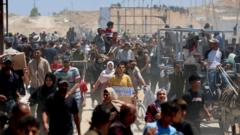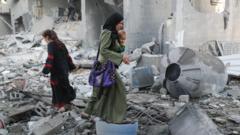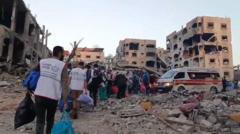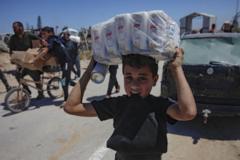Tom Fletcher, the UN's humanitarian chief, described the situation in Gaza as one of forced starvation, amidst increasing chaos and violence following the easing of the blockade. Calls for immediate humanitarian access intensify as international criticism of Israel's military actions grows.
UN Warns of 'Forced Starvation' in Gaza Amid Intense Military Conflict

UN Warns of 'Forced Starvation' in Gaza Amid Intense Military Conflict
Top UN humanitarian official claims Israel's actions in Gaza amount to war crimes as aid access remains critically limited.
Gaza is grappling with severe humanitarian crises, with top UN officials declaring that Israel's actions amount to forced starvation. Tom Fletcher, the UN's humanitarian chief, made these comments during a recent BBC interview, asserting that the conditions faced by Palestinians qualify as a war crime. Fletcher's assessment highlights a crucial shift in international perspective regarding the instability in Gaza.
Fletcher expressed regret over his earlier prediction of potential mass infant casualties due to the blockade on aid, reinforcing the necessity for precise communication. Despite the recent allowance of limited aid into Gaza after a weeks-long blockade, the situation has quickly deteriorated. Scenes of chaos erupted at Gaza Humanitarian Foundation distribution centers, with dozens injured as desperate citizens sought essential supplies.
He indicated that the systematic withholding of food from Gaza, inhabited by a starving population, reflects an intentional strategy to exert pressure on residents. Fletcher urged Prime Minister Benjamin Netanyahu to dismiss statements from Israeli officials advocating forced population displacement and emphasized the need for global compliance with humanitarian law.
The conflict has elicited mounting international criticism, with leaders from various nations demanding an end to military operations and unfettered access for humanitarian aid. Fletcher's prior statements, including warnings about potential genocide, faced scrutiny, particularly from the Israeli government, which accused him of propagating Hamas' narrative.
In the interview, Fletcher reiterated that mediation is the key to resolving the crisis and called for the release of hostages held by Hamas while questioning the overarching objectives of Israel's military campaign. He clarified the urgency of delivering aid to civilians and noted the challenges posed by escalating global conflicts, which complicate humanitarian efforts.
As violence continues following Hamas's attacks and Israel's military response, with thousands reported dead, Fletcher remains steadfast in advocating for humanitarian support in Gaza while addressing the complex dynamics at play in the broader geopolitical landscape. His following interview is set to be aired on the BBC, where he is expected to further elaborate on these urgent issues.





















